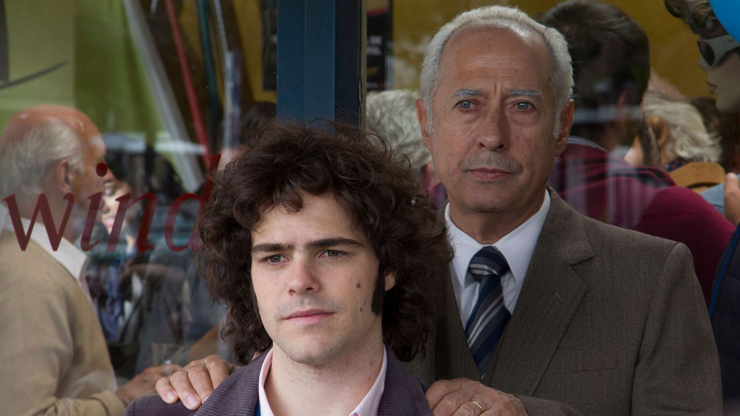
Photo (from left): Peter Lanzani, Guillermo Francella.
The Clan, Argentina's 2015 Foreign Language Oscar entry, plays like Scorsese without seasoning. It forges ahead like Costa-Gavras without the urgency. But while it's too grim and stern-faced for its own good, this fact-based chronicle of a pitch-black chapter in the South American country's contemporary history holds a queasy appeal, thanks to taut pacing, evocative period trappings and one hell of a closing shot.
It's the early 1980s, and Argentina is limping away from the Falklands War. The film opens with real news footage of newly elected president Raúl Alfonsín declaring to his constituents that a new day is before them. But what about those muscle men who lurked in the shadows doing Uncle Gaucho's dirty work in what was coined the “Dirty War?” The ones responsible for the government-sponsored kidnappings of tens of thousands of “desaparecidos” (the disappeared).
Enter Arquímedes Puccio, a state intelligence agency employee who suddenly finds himself out of a job. Look in the dictionary for the word “mercurial,” and you'll find a picture of actor Guillermo Francella in character, pale eyes as icy as his personality. You're gonna have to look elsewhere in this clan for any hint of charisma, like, say, Archie's oldest son Alejandro (Peter Lanzani), a rugby star who's daddy dearest's polar opposite in the charm department. Let's just say the two have a disagreement over Junior's career path. Papi excels at dispatching folks who speak up against government oppression, whereas Alex is a monster in the field, all while looking good in short shorts. (He's also easy on the eyes; Lanzani looks like a cross between the young Dweezil Zappa and Daniel Brühl. But I digress.)
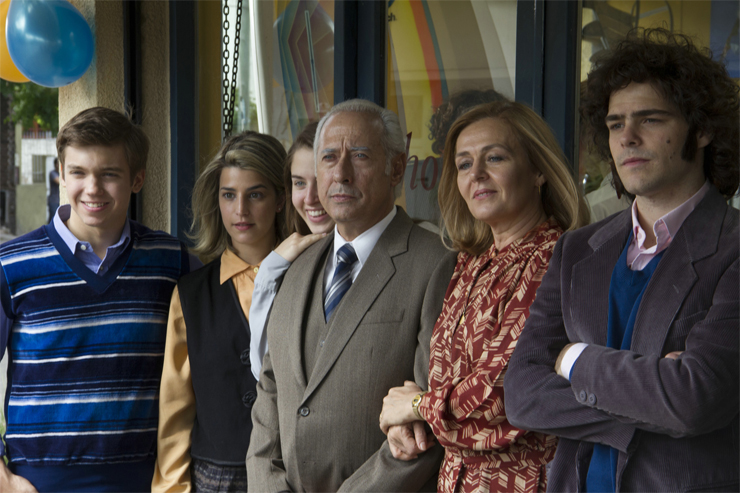
Photo (from left): Franco Masini, Giselle Motta, Antonia Bengoechea, Guillermo Francella, Lili Popovich, Peter Lanzani.
But money is a pressing matter now that Arquímedes' day job has been downsized on the road toward democracy. What's a bourgeois thug to do for a meal ticket? The family's deli shop sure isn't going to pay all the bills. Hmm. Can you say extortion? I mean, he already hates the jet-setting elite who stand to become even more filthy rich under the new government. Why not abduct a beloved family member and demand a hefty ransom … with no actual intention of returning said member alive? Bloodlust and monetary needs fulfilled. Win-win.
Of course, it's not so simple to pull this off without a hitch, so Archie asks Alex to help out. And he plays the “family first” card, the rat bastard. (When that doesn't work, dad holds the promise of big bucks like a carrot. OK, that does the trick.) So Alex reluctantly sets up a personal friend to take the fall, blissfully unaware of Daddy's “no witnesses” clause. Arquímedes' excuse when his son finds out what happened to his buddy? “Things got complicated.”
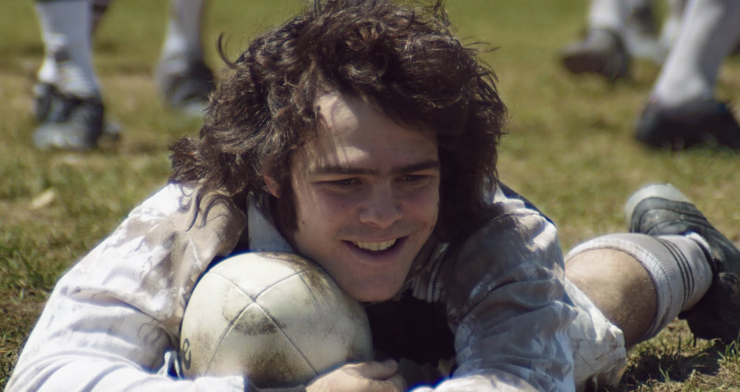
Peter Lanzani.
This is meaty stuff that would feel wildly outlandish if it weren't all true, and writer-director Pablo Trapero (Carancho) stages the kidnapping scenes with you-are-there immediacy. Francella and Lanzani help anchor the film as years of mutual resentment gradually simmer to the surface. And kudos to production designer Sebastián Orgambide for capturing the early-to-mid-1980s setting in all its tacky glory.
Trapero strikes an intriguing parallel between the Puccios' nefarious activities and roiling tensions between the social classes. When, for instance, Arquímedes opts to kidnap the son of a business entrepreneur, it's because a longtime employee claims his wealthy employer mistreats and belittles him. In the elder Puccio's mind, he's doing this for the good of Argentina, not just his own benefit. Alex, meanwhile, uses the family's blood money to open the windsurfing gear shop he always dreamed of owning.
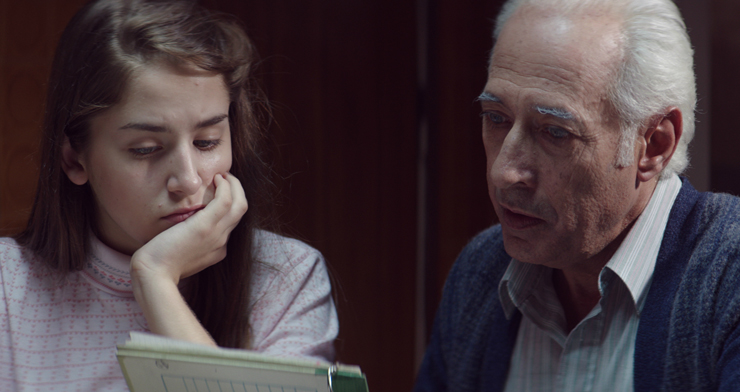
Photo (from left): Antonia Bengoechea, Guillermo Francella.
This should all pop on screen, and indeed, Trapero, who periodically flashes forwards in time to show how the family's operation unravels, keeps El Clan humming even as the overly familiar elements keep the audience one step ahead of the characters. There's a workmanlike, perfunctory nature to Trapero's direction that dilutes the material's inherent sensationalism. Like his previous work, The Clan is gritty and well-crafted without quite hitting the genre sweet spot his films seem to aim for. The song-driven soundtrack is a loud tip of the hat to Scorsese, but he lacks that director's flair, the way the GoodFellas auteur takes viewers out for a spin on the cinematic dance floor. Seeing all the pieces fall into place, I got the sense the popularity of Trapero's film, which became the highest-grossing Argentinean film to date and played to general acclaim in international film festivals like Venice and Toronto, stems more from the fact that it told this real-life tale in the first place than by how well it told said tale. (It also won the audience award at the Miami International Film Festival's GEMS showcase last fall.)
Trapero plays it straight to a fault, whereas a little social satire could have worked wonders. A director like Lucrecia Martel would have likely cut deeper, both from a formal and narrative perspective. As it stands, The Clan's stinging social critique is drowned out by a more conventional family drama, something that would have worked if Trapero had something to say beyond, "My gangster dad is a no-good bully and a sociopath." The problem is, this gangster dad is an ordinary no-good bully and sociopath.
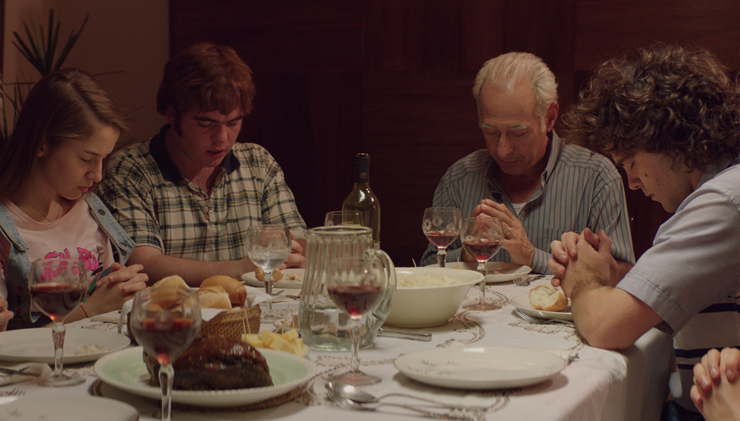
Photo (from left): Antonia Bengoechea, Gastón Cocchiaralle, Guillermo Francella, Peter Lanzani.
Another stumbling block here is a lack of interest in exploring the rest of the Puccios besides the central father-son tension. The lead actors attempt to bring more shadings than Trapero is often willing to provide. He doesn't appear to make much of an effort to flesh out Alejandro and Arquímedes' loved ones beyond the most basic traits. The women in the family, in particular, come across as one-dimensional types. For example, the film takes pains to introduce Mónica (Stefanía Koessl), the shop customer who becomes Alex's girlfriend, then gives her absolutely nothing to do. Similarly, a scene in which Alex drops off baby brother Guillermo (Franco Masini) at the airport stands out because there simply isn't another one in the film that's quite as touching.
But just as I was ready to tune out of The Clan, Trapero injects the movie with an eleventh-hour surge that climaxes in a nifty shot that, I kid you not, is reminiscent of a Road Runner cartoon, in the best possible way. (Call it the Wile E. Coyote finale.) It ends the movie on a high note, but it doesn't quite take away the feeling that there was a jazzier, more imaginative film to be made out of this riveting true story.
The Clan opens Friday, March 25 at the Cinema Paradiso Hollywood, Coral Gables Art Cinema, O Cinema Miami Beach and the Tower Theater. Watch for miamiartzine.com's The Clan ticket giveaway Tuesday. Sign up for our enewsletter to be entered into the drawing.
 MAIN MENU
MAIN MENU

